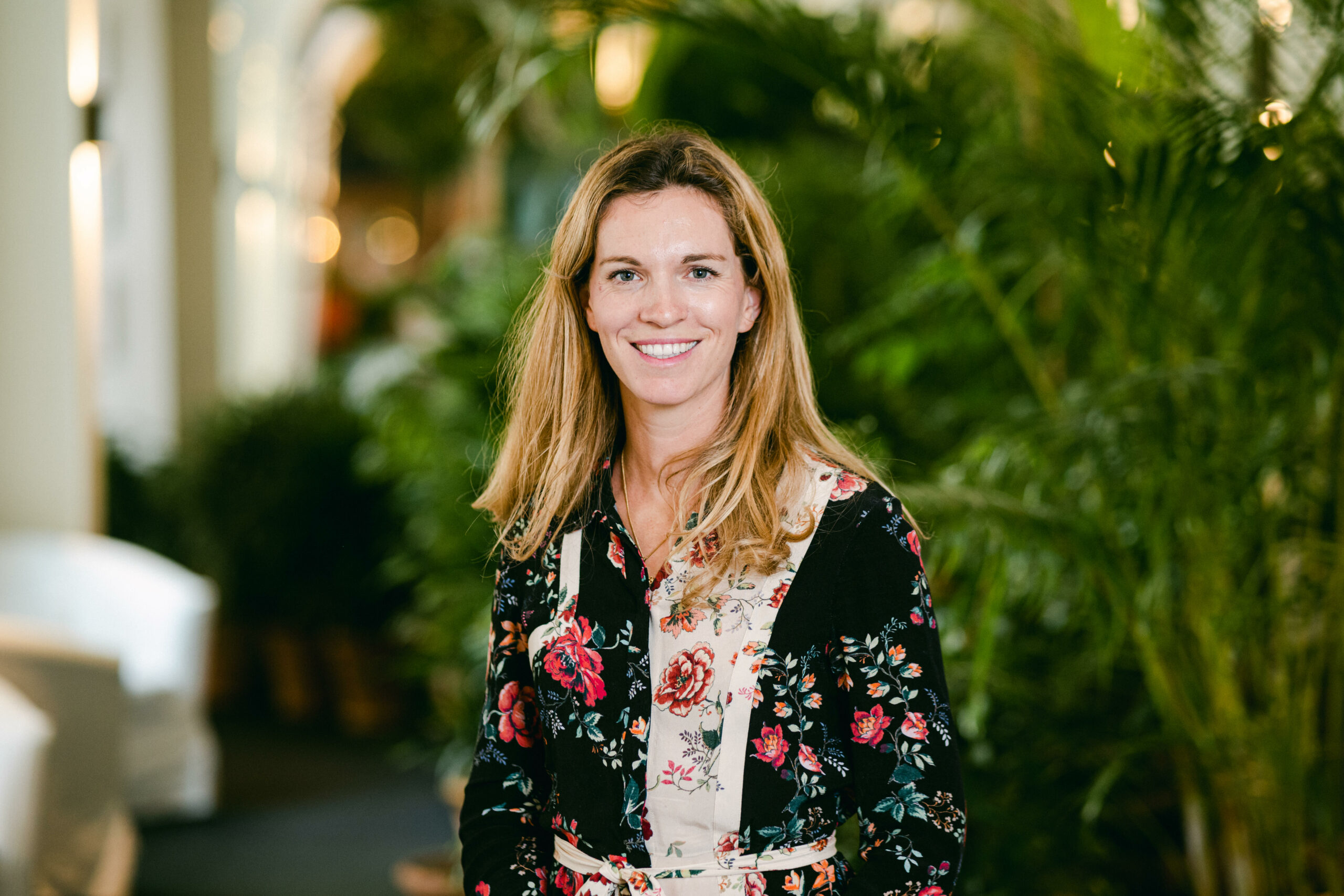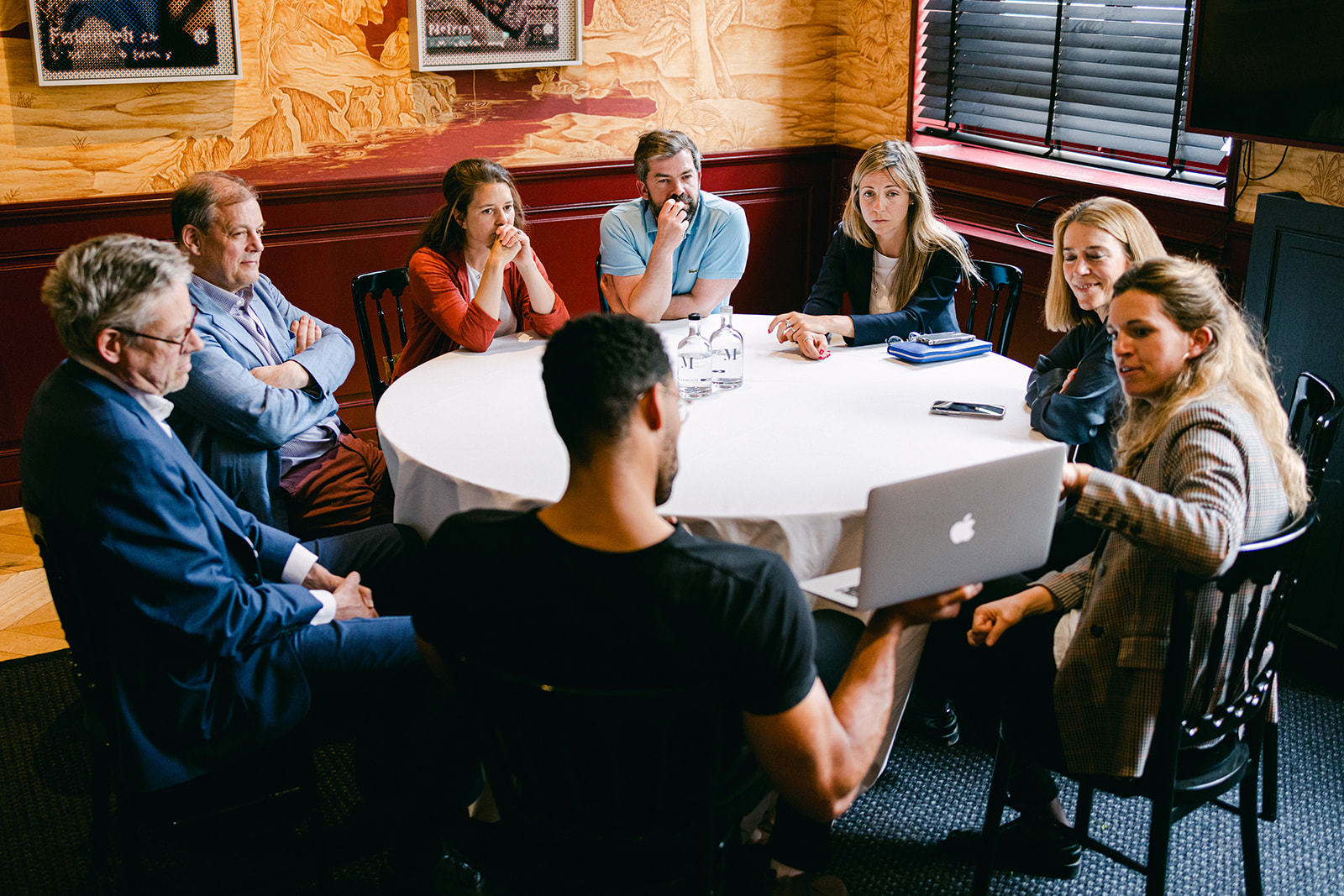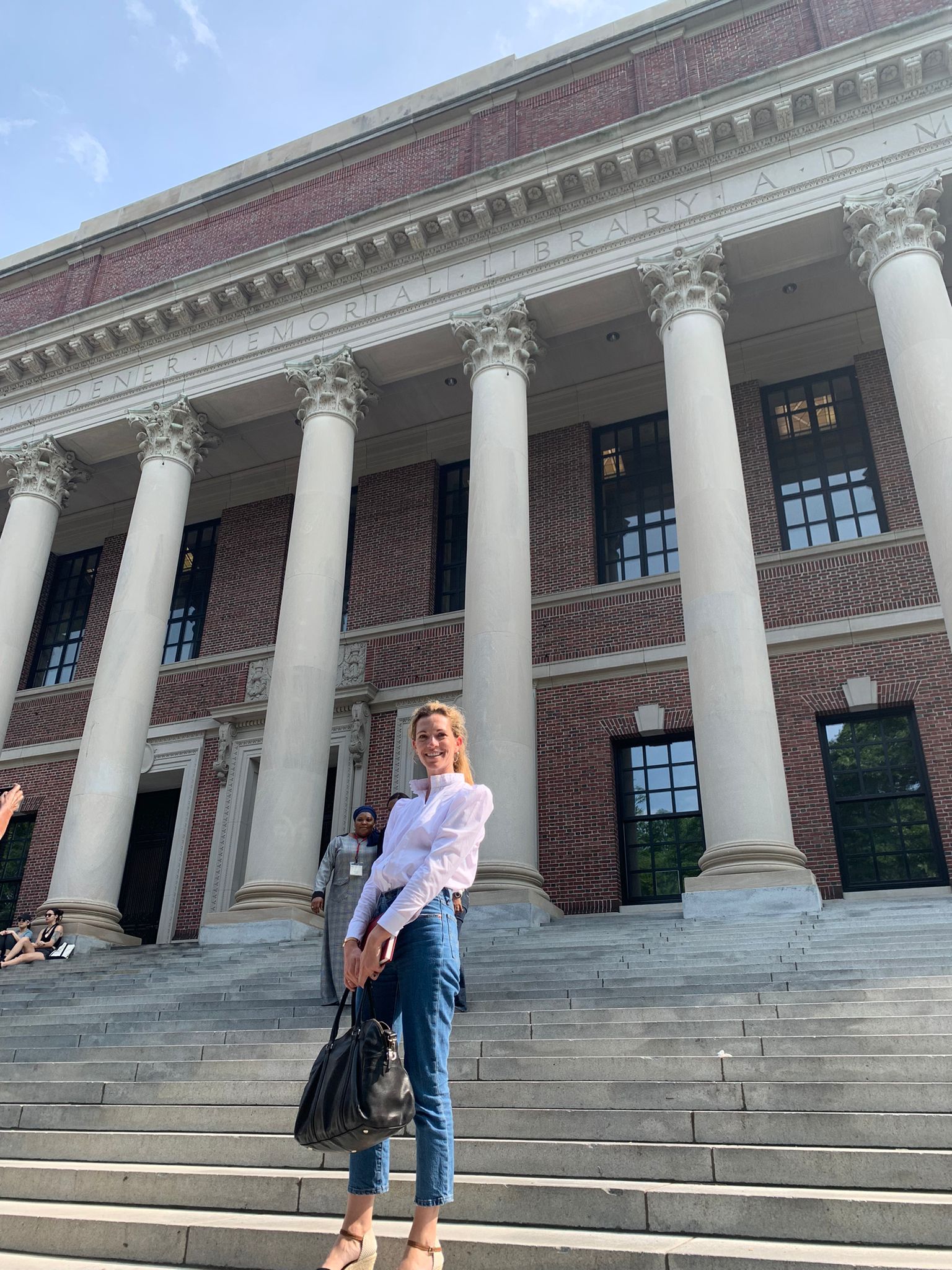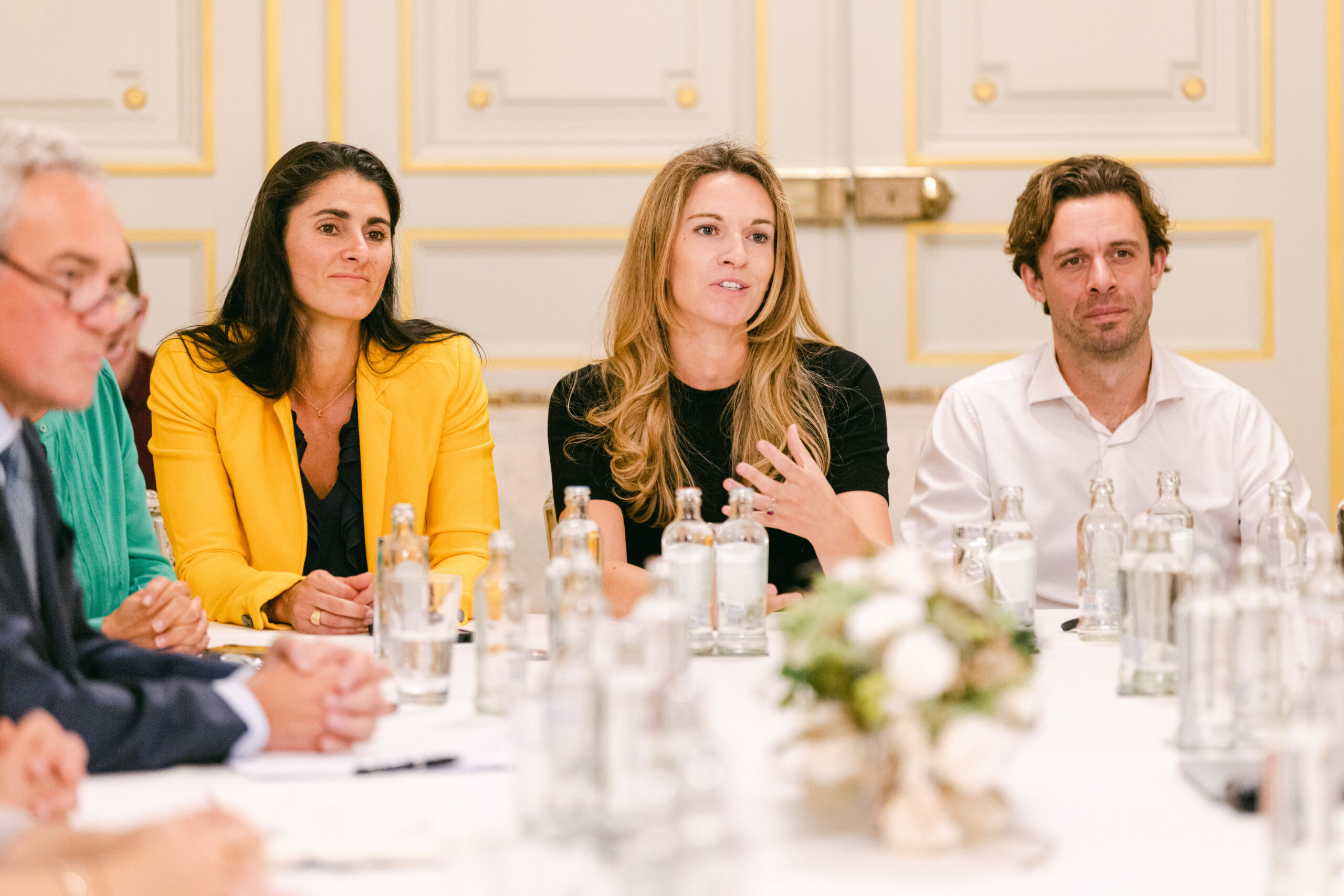
At the Degroof Petercam Foundation, we mainly focus on employment, which is itself very transversal. Many of today’s issues are related to it: retirement, health, equal opportunities, and family life. Family life and employment are two themes that are very present in my Field Work at 40u40. It was important for me to work on these themes within the program because they are personal questions for many people: how to make family fulfilment and being young parents compatible with the world of work?
Ayoub Assabban, Bastien Van Wylick, Caroline Guyot, Mikael Wornoo, Sebastien Morvan, and I all cared deeply about that theme and formed a Field Work group. At the beginning of the Field Work, we did not have a specific outcome in mind. We came out of lockdowns and wanted to do something about young people’s mental health, which was very low at that time. By tracing back the causes and the source of this malaise, we came to the conclusion that it starts in early childhood. Therefore, we decided to work on the norms that support the new reality of two young working parents. Currently, the situation has many negative consequences on children, the potential lack of parental presence, and gender inequality between men and women. The latter often have to choose between a career and taking care of their children. The “1000 First Days” focus on early childhood by seeking what public policies could do to support young families.

I applied to Harvard Kennedy School (HKS) in ‘Implementing Public Policy,’ which is a reference for nonprofit organizations and civil servants with a focus on societal impact. In the program, each person must bring a theme or project, and I naturally decided to focus on public policies for young families.
I am closing my first year of the program in November 2023. Right now, I am in a course to learn a methodology called Problem-Driven Iterative Adaptation, a toolkit to address complex problems. One of the learnings that stuck with me was that you do not address a complex problem like you would address a simple problem. Simple problems have known solutions, tested in local contexts, often with the main hurdle being budget constraints. However, complex problems, such as poverty, employment, gender issues, involve multiple factors, effects, and contexts, making them resistant to conventional solutions. We try to address them like simple problems, which leads to nowhere. The crucial lesson is that we need a mindset shift where we emphasize understanding the problem before seeking solutions.
Understanding the context and root causes becomes paramount in dealing with complex problems. We need to let go of the need to find immediate solutions and concentrate on understanding the problem first; we need to find the root causes, what keeps the problem persisting. We need to understand the context to see what we need to change to then move the system and change the context towards solutions. This approach involves deconstructing the problem by engaging with others; complex issues require collaboration. At Harvard, we learned about active listening and how to mobilize people for a cause.
In summary, the key takeaways from my experience so far are to refrain from addressing a complex problem like a simple problem, to prioritize understanding over immediate solutions and to let go of the rush to find answers. These are also learnings that are very useful in the 40u40 Field Work: investing time in problem exploration instead of searching for quick solutions. We need to take time to deeply understand complex social issues before solving them.

From working with a multicultural group in an international context, I came to the conclusion that the issues regarding family policy are more international than I initially thought. I gained insights from non-European countries, such as Brazil and the United Arab Emirates, where people are also affected by challenges such as the increasing unaffordability of parenthood or societal norms that pressure more women than men to stop working to raise their children. It made me realize that even though the context is different, the main questions about family are universal. When you start deconstructing a problem, you are left with issues that all people care about, you will find a common thread, no matter the context. Understanding what truly matters for everyone is a meaningful starting point to tackle complex issues.
The second insight I gained from working with people from all over the world revolves around the question of how we measure impact? How do you measure if a complex problem has been solved and whether or not public policies succeed in addressing issues? I learned that some countries are funded by institutions, and those also ask for concrete examples or results to see if their program works. They implement external authorities that address local players in policy making to find out if goals are reached. This aspect was very interesting to me, to see different methods to evaluate complex solutions and the positive contributions that external funders can bring to the table alongside financial support.

The Harvard Kennedy School Program I am doing is spread out to be six years, but I will try to do it in three. The purpose of my project on parenthood is to make something real out of it that goes beyond the classroom. I thus proposed to the foundation I am leading to recycle these learnings to address the issue in the context of Belgium’s 2024 elections, and it was approved with a budget.
I want to explore how we can incubate solutions in Belgium, incorporating the insights from my time at Harvard into the Degroof Petercam Foundation. The focus is on creating an alliance of players in Belgium that care about the intersection of parenthood and employment, particularly through the lens of gender equality. Our challenges lie in giving parents a unified voice. Parents often feel like it is difficult for them to express themselves; they do not have a federation, a political party, they cannot go on the street and strike. One goal is to bring parents together and ensure everyone is heard. We thrive to deconstruct the complex problem, which is like a puzzle, made of small pieces like gender and employment issues, and we want to identify the smaller puzzle pieces by creating a unifying voice for the parents. It is an ambitious endeavor, but there is room to take risks, room for trial and error and a need to try fostering positive change in the landscape of parenthood and employment.
This project began with the proactive initiative of Belgium’s 40 under 40, where I joined forces with my peers to tackle the common challenge of balancing parenthood and employment. Now, looking ahead to the next steps, I want to invite the 40u40 Community to continue showing interest and care in the issues, and hopefully participate in the launch of new initiatives in 2024!
| Cookie | Duration | Description |
|---|---|---|
| cookielawinfo-checkbox-advertisement | 1 year | Set by the GDPR Cookie Consent plugin, this cookie is used to record the user consent for the cookies in the "Advertisement" category . |
| cookielawinfo-checkbox-analytics | 1 year | Set by the GDPR Cookie Consent plugin, this cookie is used to record the user consent for the cookies in the "Analytics" category . |
| cookielawinfo-checkbox-functional | 1 year | The cookie is set by the GDPR Cookie Consent plugin to record the user consent for the cookies in the category "Functional". |
| cookielawinfo-checkbox-necessary | 1 year | Set by the GDPR Cookie Consent plugin, this cookie is used to record the user consent for the cookies in the "Necessary" category . |
| cookielawinfo-checkbox-others | 1 year | Set by the GDPR Cookie Consent plugin, this cookie is used to store the user consent for cookies in the category "Others". |
| cookielawinfo-checkbox-performance | 1 year | Set by the GDPR Cookie Consent plugin, this cookie is used to store the user consent for cookies in the category "Performance". |
| CookieLawInfoConsent | 1 year | Records the default button state of the corresponding category & the status of CCPA. It works only in coordination with the primary cookie. |
| elementor | never | This cookie is used by the website's WordPress theme. It allows the website owner to implement or change the website's content in real-time. |
| JSESSIONID | session | New Relic uses this cookie to store a session identifier so that New Relic can monitor session counts for an application. |
| wpEmojiSettingsSupports | session | WordPress sets this cookie when a user interacts with emojis on a WordPress site. It helps determine if the user's browser can display emojis properly. |
| Cookie | Duration | Description |
|---|---|---|
| lang | session | LinkedIn sets this cookie to remember a user's language setting. |
| li_gc | 5 months 27 days | Linkedin set this cookie for storing visitor's consent regarding using cookies for non-essential purposes. |
| lidc | 1 day | LinkedIn sets the lidc cookie to facilitate data center selection. |
| Cookie | Duration | Description |
|---|---|---|
| _ga | 1 year 1 month 4 days | Google Analytics sets this cookie to calculate visitor, session and campaign data and track site usage for the site's analytics report. The cookie stores information anonymously and assigns a randomly generated number to recognise unique visitors. |
| _ga_* | 1 year 1 month 4 days | Google Analytics sets this cookie to store and count page views. |
| _gat_gtag_UA_* | 1 minute | Google Analytics sets this cookie to store a unique user ID. |
| _gcl_au | 3 months | Google Tag Manager sets the cookie to experiment advertisement efficiency of websites using their services. |
| _gid | 1 day | Google Analytics sets this cookie to store information on how visitors use a website while also creating an analytics report of the website's performance. Some of the collected data includes the number of visitors, their source, and the pages they visit anonymously. |
| CONSENT | 2 years | YouTube sets this cookie via embedded YouTube videos and registers anonymous statistical data. |
| Cookie | Duration | Description |
|---|---|---|
| li_alerts | 1 year | Description is currently not available. |
| Cookie | Duration | Description |
|---|---|---|
| bcookie | 1 year | LinkedIn sets this cookie from LinkedIn share buttons and ad tags to recognize browser IDs. |
| bscookie | 1 year | LinkedIn sets this cookie to store performed actions on the website. |
| IDE | 1 year 24 days | Google DoubleClick IDE cookies store information about how the user uses the website to present them with relevant ads according to the user profile. |
| test_cookie | 15 minutes | doubleclick.net sets this cookie to determine if the user's browser supports cookies. |
| VISITOR_INFO1_LIVE | 5 months 27 days | YouTube sets this cookie to measure bandwidth, determining whether the user gets the new or old player interface. |
| VISITOR_PRIVACY_METADATA | 6 months | YouTube sets this cookie to store the user's cookie consent state for the current domain. |
| YSC | session | Youtube sets this cookie to track the views of embedded videos on Youtube pages. |
| yt-remote-connected-devices | never | YouTube sets this cookie to store the user's video preferences using embedded YouTube videos. |
| yt-remote-device-id | never | YouTube sets this cookie to store the user's video preferences using embedded YouTube videos. |
| yt.innertube::nextId | never | YouTube sets this cookie to register a unique ID to store data on what videos from YouTube the user has seen. |
| yt.innertube::requests | never | YouTube sets this cookie to register a unique ID to store data on what videos from YouTube the user has seen. |